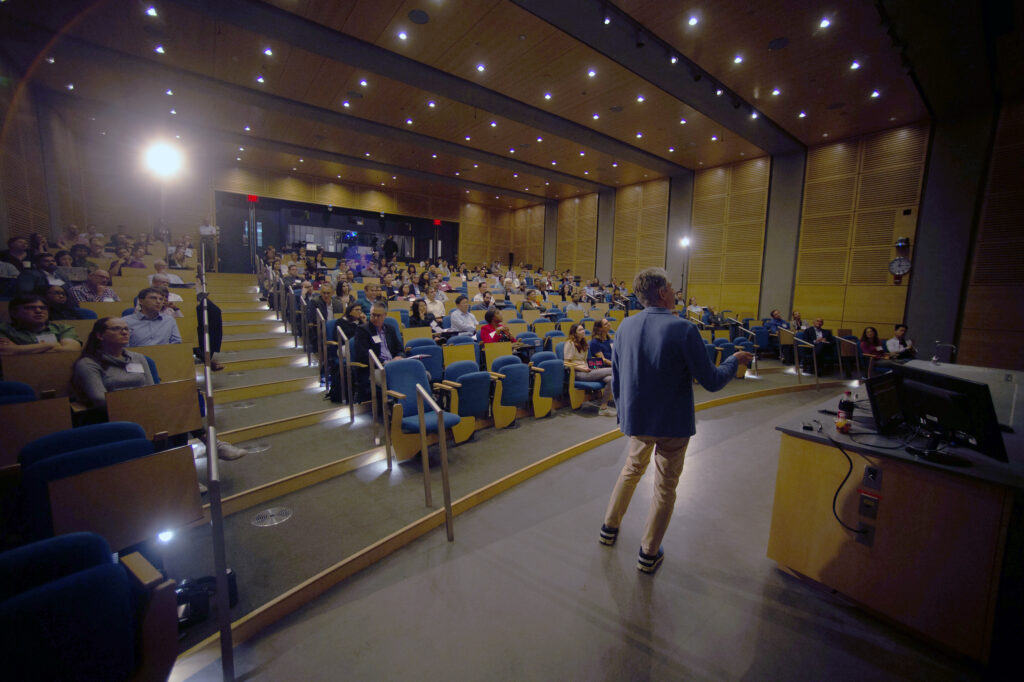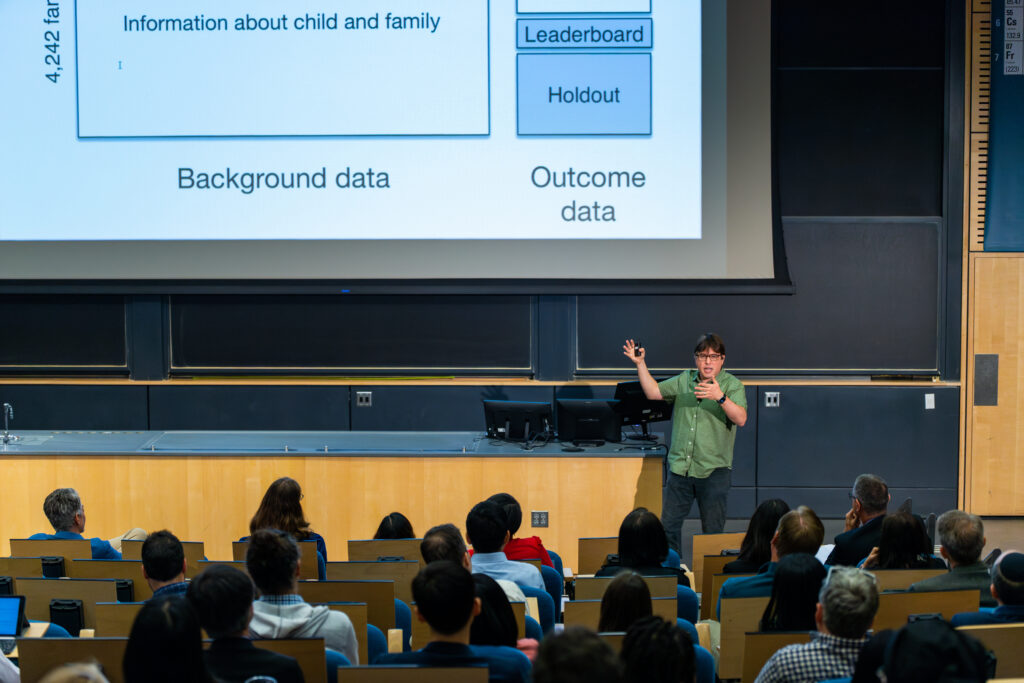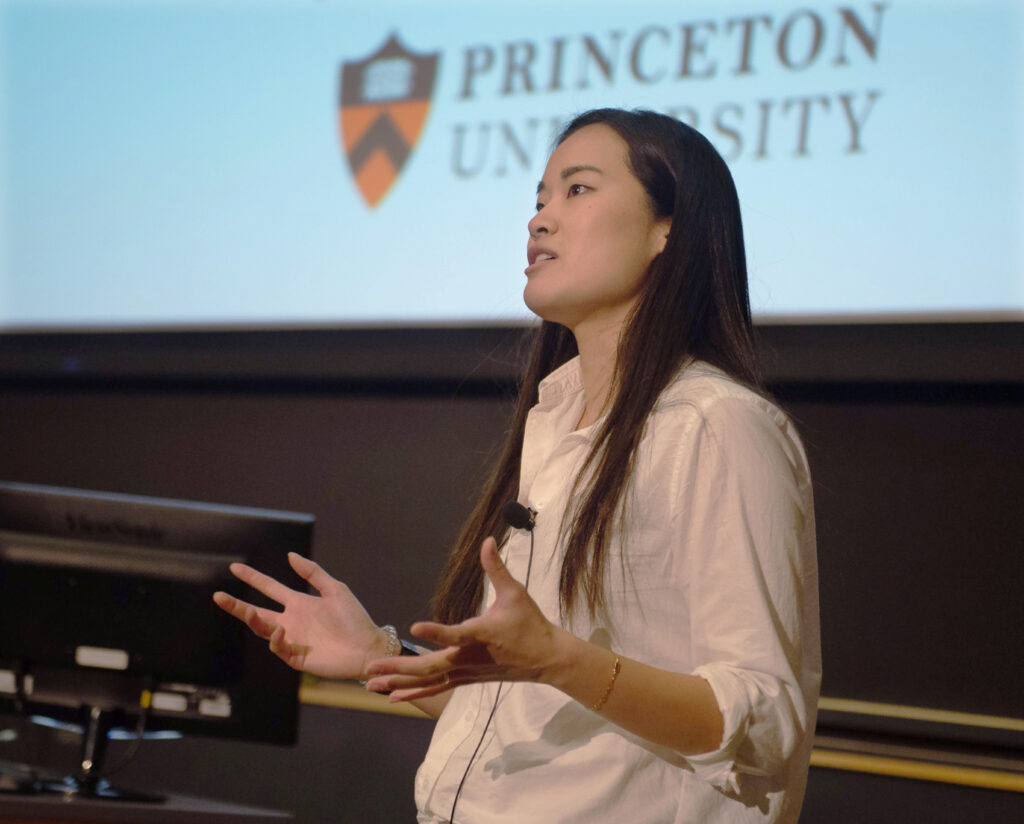In-Person Blue Sky Thinking (and collaboration) at PCI Symposium

Vexed for years over how to test the limits of predictability in his work, Professor of Sociology Matthew Salganik might just have hit on a new approach, one that underscores the very point of the Princeton Catalysis Initiative (PCI).
Looking out over a packed audience at PCI’s Fifth Symposium last month at Princeton Chemistry’s Taylor Auditorium, Salganik asked, “How do we study the limits of prediction? I think that is a fundamental question. I hope some of you somewhere in this room are thinking about this in your own field, because I would love to talk to you about how you might study it.”
With one simple appeal, Salganik tapped into PCI’s founding credo: solving the challenges of research through collaboration.
The invitational Symposium on May 24 put Princeton faculty in a room with industry representatives in hopes that research and funding opportunities converge.
The 25 faculty presenters gave eight-minute “flash talks” that showcased the breadth of campus research: a smartphone-based app for testing brain function; a platform that uses the cold of space to cool the environment; bird-wing inspired engineering design. The wide-ranging talks generated excitement for blue sky thinking in search of development. View this year’s flash talks.
It’s a formula that has proven itself in the six years since PCI’s founding.
Back in 2017, a couple of chemistry professors wanted to know more about the research going on outside their own labs. The idea for a program shared by all researchers gained traction, and soon they had secured University funding for the first PCI symposium. Their modestly ambitious goals for the campus-wide initiative projected 150 cross-field collaborations with $10M in funding within a few years.
Today, 500 collaborations across 12 departments are backed by committed funding that reaches nearly $100M.
Part of the appeal of PCI is accessibility. The flash talks encapsulate novel research while also posing intriguing questions in search of multidisciplinary solutions, and they make for stimulating theater.
During his presentation, for example, Salganik displayed a slide with bar graphs on the predictability of life trajectories for at-risk children in Pittsburgh. But instead of drawing conclusions about the data itself, Salganik pointed to the empty space between the peaks and valleys.
“The dominant pattern here is this vast white space,” he said. “Instead of thinking about studying predictability systematically or trying to get predictability to incrementally increase, how do we study its limits? If you’re a policy maker and you have to make decisions about whether to use systems like this, a more basic question is, how predictable are these things? If they’re very predictable, that leads to one set of concerns, and if they’re not predictable at all, that leads to another.”

Sociologist Matthew Salganik presents “ChatGPT for People and the Limits to Prediction” at Taylor Auditorium.
“He was just fantastic,” said Professor Sir David MacMillan, the James S. McDonnell Distinguished University Professor of Chemistry, co-recipient of the 2021 Nobel Prize in Chemistry, and a founding member of PCI. “What Matt was able to do was bring it all together in one absorbing presentation. That is exactly what PCI stands for: great research and great ideas looking for great partners.
“When you realize there are whole research groups behind all of these individuals you start to see how big the impact can be. I think this was the best PCI event to date.”
Mechanical and Aerospace Engineering Assistant Professor Aimy Wissa’s talk on “Bio-inspired Locomotion Strategies” featured a video on the balletic precision of birds in flight and how engineers can adapt their wing aerodynamics to the design of UAVs. Civil and Environmental Engineering Assistant Professor Jyotirmoy Mandal presented questions tailored to appeal to his inquisitive colleagues: “Can we design the ideal polymer/ceramic for radiative cooling at a molecular level?” and “How best can radiative coolers be deployed in resource poor settings?” And Ellen Zhong’s talk on “Machine Learning for Structural Biology” focused on developing algorithms that uncover protein dynamics.

Ellen Zhong, assistant professor of computer science, presents “Machine Learning for Structural Biology.”
“I thought the symposium was an extraordinary experience,” said Zhong, assistant professor of computer science. “The flash talk format provides this incredible, fast-paced cross-section of the research at Princeton. I was overwhelmed with all the interest in our work after the talk, and I’m excited to form new collaborations that both expand the scope of our research and let me learn about new areas.”
An important goal of the Symposium is connecting ideas with funding opportunities, so PCI’s six industry partners were all represented, attending both the flash talks and the dinner that followed. Janssen, the fourth corporate entity to sign a partnership with PCI, brought a number of company leaders.
“As Janssen enters our fifth year of PCI membership, we have benefitted from exceptional interactions with the Princeton University academic community,” said Tamar Grossman, vice president and global head of RNA, Gene Therapy and Delivery at Janssen. “We have supported 10 projects thus far, resulting in impactful publications and extensive knowledge sharing, and look forward to many more years of collaboration with Dave, Ian, and Princeton’s PCI network.”
Researchers interested in working with the Princeton Catalysis Initiative are encouraged to apply for funding, whether or not they attended the symposium, by contacting Ian Davies, director of PCI, at [email protected]. Applications are due by June 30, 2023, and awards will be announced in July.
The Princeton Catalysis Initiative acknowledges generous support from Anthony Evnin ’62 and Eric ’76 and Wendy Schmidt through the Schmidt DataX Fund.
